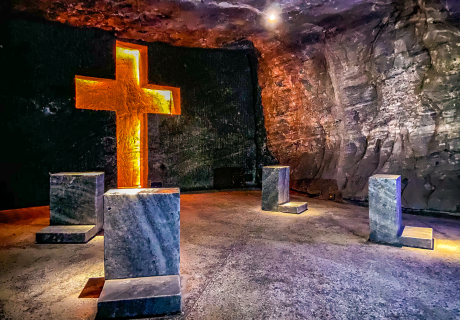If you’ve been around Australian churches for any time, you will have heard about the 17th-century prophecy concerning the Great Southland of the Holy Spirit. We sang about it with gusto in the Nineties until we realised the lyrics offended some of our indigenous friends. So, what is this prophecy and has it been interpreted correctly by today’s church?
Expedition
It all began a little over 400 years ago (1605) when a Portuguese explorer, Pedro Ferdinand de Quirós, secured sponsorship from Pope Clement VIII and King Philip III of Spain to seek out the southern continent – Terra Australis Incognito (Unknown South Land).
According to historian Gunter Schneider, “It was felt that an undiscovered southern continent had to exist because the known land masses of the southern hemisphere were not sufficient to balance those of the northern half of the globe.” We are amused by this assessment today, but it was considered factual then.
De Quirós, a Catholic Jew, set sail from Peru to discover and create a holy settlement called The New Jerusalem so that the indigenous people “may have knowledge of the Gospel and be brought into Spiritual obedience.” Where and what he found has caused much debate.
Declaration
In May 1606, de Quirós proclaimed: “Be witness the heavens and the earth, and the sea and all its inhabitants, and those who are present, that I, the Captain Pedro Fernandez de Quirós, in these parts which up to the present time have been unknown … [W]ith authority from the Supreme Roman Pontiff, Clement VIII, and by order of the King, Don Philip III, King of Spain … I take possession of all the … lands that I have newly discovered … and all this region of the south as far as the Pole, which from this time shall be called Austrialia del Espiritu Santo.” And no, I didn’t misspell Australia.
De Quirós named the land in honour of Philip III of Spain of the House of Hapsburgs, who ruled Spain then and was known as the House of Austria. The name did not come from Terra Australis Incognita. He likely named it such to ingratiate himself with the king in the hope of receiving money for future expeditions. Austrialia del Espiritu Santo translates as the Austrian Land of the Holy Spirit.
But de Quirós hadn’t discovered the southern continent, only the largest island in what is today known as Vanuatu.
Motivation
Australian historian Manning Clark described de Quirós as “one of the flowers of the Catholic reformation, part of that movement of religious idealism and of missionary fervour which strengthened the church after the disasters of Luther and Calvin.” The Catholic Reformation was a counter-movement seeking to gain ground the Roman Church had lost to the Protestants.
De Quirós, with the backing of Pope Clement VIII, sought to bring the salvation offered by the Catholic Church to the pagans and convert them to Catholicism. He named a stream running into the island’s bay the river Jordan and declared the New Jerusalem would be built amid the coral reefs! His religious fervour caused great unrest amongst his crew.
The colony was soon abandoned due to the understandable hostility of the Ni-Vanuatu people, and on 8 June 1606, de Quirós set sail to return to Peru. He had travelled more than 38,000 kilometres, never to raise another expedition, and died in 1614 thinking he had stood on the land mass of the southern continent.
Fiction
Much of what we’ve heard about Australia as the Great Southland of the Holy Spirit is a myth. While I don’t doubt de Quirós’ missionary zeal, he wasn’t a seer and didn’t make any prophetic declarations about our nation. The apostle Paul encourages us to “have nothing to do with godless myths and old wives’ tales; rather, train yourself to be godly.” We would do well to heed his advice.
We would also do well to remember that God’s Kingdom isn’t a geographical location. Jesus taught the very opposite. When the Pharisees asked him when the kingdom would come, Jesus replied, “The kingdom of God is not coming with something observable; no one will say, ‘Look here!’ or ‘There!’ For you see, the kingdom of God is [within] you.” Consider those words in light of those that preach the Great Southland “prophecy.” They say revival will come to Australia because of a declaration of the Catholic missionary. Jesus told us not to say, ‘Look here or there.’ God’s kingdom is not a geographical location; it lies within the hearts and lives of all people who consent to God’s rule.
God’s kingdom attracts people “from every nation, all tribes and peoples and languages.” No ethnic group has a geographical advantage! God does not favour one nation over another. “For God so loved the world“ stands at the very heart of the gospel.
Colonisation
The world is outraged today when one country invades, annexes, or occupies another, and rightly so. And yet, this is what Christians and churches celebrate when they buy into the so-called Great Southland prophecy.
De Quirós declaration spoke of hitherto unknown parts that he possessed in the name of Jesus, St Francis and John of God, and all the professed members of their Orders. He also added “in the name of King Philip III” because he was paying the bills.
It must be remembered that people already owned and occupied these lands. It appears that little consideration was given to a statement made by Paul in Acts speaking of the human race, “[God] marked out their appointed times in history and the boundaries of their lands.” Colonisation ignored this truth and stole land from indigenous peoples. It was (and is) the ultimate affirmation of white supremacy.
While I acknowledge that our forebears did this, it does not absolve us of all responsibility. We must recognise past injustices, apologise, and work in unity with Indigenous people to find a shared future where everyone is respected.
Conclusion
Pedro Fernandez de Quirós was not a Prophet Over Australia. His declaration was a politically and institutionally driven grab for land already occupied. None of what he “prophesied” came to pass, much like many of today’s so-called prophecies. In recent times, modern “prophets” have proclaimed that Trump would regain the presidency (in 2020) and that COVID-19 would be over by Passover 2020. They were wrong on all counts and are a blight on a genuine and precious spiritual gift that is intended to strengthen, encourage and comfort God’s people.
The Scriptures encourage us to test prophecy, but so many of God’s people gullibly soak all this stuff up and confuse emotional hype for the presence of God.
It seems we contemporary Christians are addicted to the spectacular. Something exciting has always got to be “about to happen.” The ‘revival carrot’ is dangled in front of people to keep them engaged. This year’s vision (or conference) has got to be bigger and better than last year’s. “What’s next?” we ask instead of simply getting on with what God has already placed in our hands.
Compare this to the Scriptures’ teaching on simply committing ourselves to following and living like Jesus. Eugene Peterson calls the Christian life a long obedience in the same direction. Let’s get on with living authentically with Jesus and each other and stop buying into godless myths and old wives’ tales.














